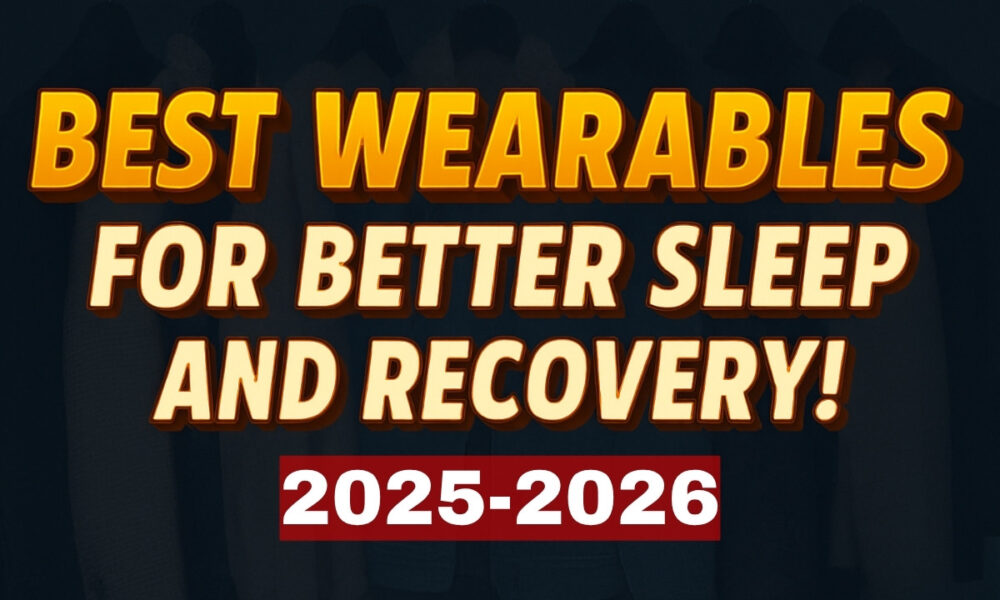Healthy
Best Wearables for Better Sleep and Recovery!

In today’s fast-paced digital world, sleep is often the first thing sacrificed. Yet, quality sleep is essential — not just for physical energy but also for cognitive function, emotional regulation, and long-term health.
As sleep disorders rise, millions are turning to wearable technology to monitor, analyze, and improve their nightly rest. In 2026, sleep tracking has gone beyond basic step counting — modern wearables offer real-time data, personalized insights, and even actionable coaching.
From smartwatches to dedicated sleep rings, wearable tech has become a powerful ally in building healthy sleep habits. This post dives into how it works, the most effective devices, and tips to maximize your sleep potential.
Why Sleep Matters More Than Ever
- Boosts Brain Function: Memory, focus, and decision-making improve with regular deep sleep.
- Strengthens Immunity: Poor sleep increases susceptibility to illness.
- Regulates Mood: Lack of sleep heightens anxiety, irritability, and depression.
- Improves Metabolism: Sleep affects appetite control and weight balance.
Yet, nearly 1 in 3 adults reports poor sleep quality — often due to stress, poor routines | or digital overstimulation.
How Wearable Tech Enhances Sleep
Modern wearable devices offer far more than just tracking. Here’s how they help improve sleep:
Key Benefits:
- Sleep Stage Detection: Measures REM, light, and deep sleep cycles.
- Heart Rate & HRV Monitoring: Indicates restfulness and recovery quality.
- Smart Wake Alarms: Wakes you gently during the lightest sleep phase.
- Sleep Score Feedback: Gives daily summaries for improvement.
- Environmental Analysis: Tracks temperature, noise, and movement.
- Personalized Coaching: Some devices provide daily tips to optimize routines.
Best Wearable Devices for Sleep in 2026
| Device Name | Type | Key Features | Best For |
|---|---|---|---|
| Oura Ring Gen 4 | Smart Ring | Advanced sleep scoring, HRV, temperature tracking | Deep sleep analysis |
| Whoop 5.0 | Wrist Band | Recovery-focused, heart rate & strain analysis | Athletes & biohackers |
| Fitbit Charge 6 | Fitness Band | Sleep stages, snore detection, wellness dashboard | General users |
| Apple Watch X | Smartwatch | Sleep tracking + integrations with Health app | iOS ecosystem users |
| Withings ScanWatch 2 | Hybrid Watch | Sleep apnea detection, oxygen monitoring | Medical-grade insights |
| Samsung Galaxy Watch 7 | Smartwatch | Personalized sleep coaching, skin temperature | Android users |
Tips to Build Healthy Sleep Habits Using Wearables
1. Track Consistently
Wear your device every night for at least 2–4 weeks to collect meaningful data.
2. Set Sleep Goals
Use app dashboards to define your target bedtime and wake time.
3. Create a Pre-Sleep Routine
Many apps now offer wind-down reminders, breathing exercises, or calming music based on your tracked stress levels.
4. Avoid Late-Night Screen Use
Use wearable data to track how screen exposure affects your rest time and quality.
5. Monitor Your Environment
If your wearable supports it, track ambient noise or temperature and adjust accordingly.
6. Adjust Based on Sleep Score
Rather than ignoring poor scores, reflect on possible causes: caffeine, stress, irregular schedule — then test changes.
Wearables: A Silent Sleep Coach
Unlike traditional methods, wearable tech works passively — no extra effort, just results. What makes them effective is their ability to:
- Translate sleep data into understandable insights
- Recommend real behavior changes
- Give reminders and hold you accountable
- Create a personalized sleep improvement loop
Whether you’re a student, a night-shift worker, or a high-performing professional, wearable tech can adapt to your lifestyle — and help you build sleep into your long-term success plan.
Conclusion
The future of sleep health is already here — and it’s wearable. With devices like the Oura Ring, Fitbit, or Apple Watch, we now have scientific insights at our fingertips to help optimize rest, boost recovery, and restore balance.
Good sleep isn’t about doing more — it’s about doing less, more effectively , With the right wearable and a commitment to consistency, you can transform your nights, recharge your days, and improve your well-being long-term.